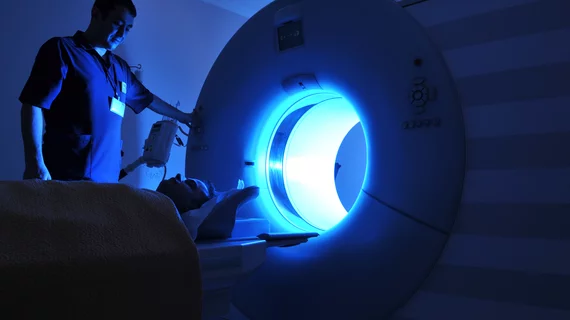Some respirators not safe for use during MRI exams, imaging experts warn
As radiology providers attempt to maintain regular business during the pandemic, a team of experts is warning that some ventilators may not be safe during MRI exams.
Scientists with one Irish hospital spelled out their concerns in a new technical report, published Tuesday in Clinical Radiology. They noted that three out of four respirators tested at their institution are “MR unsafe,” having a high susceptibility to magnetization.
Instead, they encouraged individuals to wear surgical masks that offer a World Health Organization-approved, MR-safe alternative.
“MRI professionals need to be aware of these issues and are advised to test any respirator used locally with a strong >1,000 gauss hand-held magnet as recommended by the American College of Radiology guidance on MRI safe practice,” wrote lead author O.M. Murray, with the Department of Radiology at Mater Private Hospital in Dublin, and colleagues.
To reach their conclusions Murray and company tested four commonly available respirators and one facemask. Those included:
- A 3M Aura respirator FFP3 1863.
- Two Kolmi respirators FFP2 and FFP3.
- A Halyard Technology respirator FFP2.
- And a Dahlhausen surgical facemask.
Investigators first tested the masks outside of the MRI area using a strong, hand-held magnet. They were then placed on the face of a 3D-printed head, which scientists positioned on the MR imaging table.
All respirators except for the Halyard displayed “strong” magnetic attraction, completely losing contact with the phantom head. These masks also interfered with imaging, Murray and colleagues wrote, creating “considerable image artifact” in some cases.
The bottom line is that patients suspected or proven to have COVID-19 in whom MRI is required should wear surgical masks, the authors concluded. They added that it is not necessary to remove the metal nose piece in models such as the Dahlhausen, as it is not ferromagnetic.
Staffers who enter the MRI room can wear a respirator or face mask, but Murray and colleagues urged caution. Their study was also limited in its reach, due to widespread shortages of such supplies.
“All respirators that were available were tested, and given the findings and wide variation in respirators available internationally, the important message from the present study is that respirators may not be MRI safe,” they concluded.

